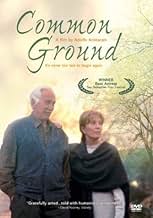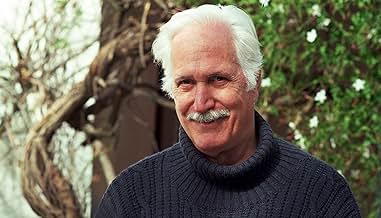CALIFICACIÓN DE IMDb
7.6/10
2.1 k
TU CALIFICACIÓN
Un profesor de pedagogía de 60 años es obligado a retirarse debido a sus altos ideales y se va a vivir al campo junto con su esposa.Un profesor de pedagogía de 60 años es obligado a retirarse debido a sus altos ideales y se va a vivir al campo junto con su esposa.Un profesor de pedagogía de 60 años es obligado a retirarse debido a sus altos ideales y se va a vivir al campo junto con su esposa.
- Dirección
- Guionistas
- Elenco
- Premios
- 13 premios ganados y 13 nominaciones en total
- Dirección
- Guionistas
- Todo el elenco y el equipo
- Producción, taquilla y más en IMDbPro
Opiniones destacadas
10jotix100
Adolfo Aristrain is one of the best Argentine directors working today. As proved by his previous films, this director goes deep into the souls of the characters he paints for us on the screen canvas. Working on Lorenzo F. Aristrain's novel, in which he is credited with co-writing the screen adaptation together with Kathy Saavedra, the director achieves a tremendously appealing film that will resonate with audiences of all ages.
The story presents us with a university professor who suddenly loses his job at the beginning of the film. He is seen telling his students to be honest in whatever they decide to do in life. In a way, he is asking, perhaps, to emulate him, since he has given all the students his best and more productive years. Finding himself unemployed, and with no assets to speak of, makes him think about what to do with the new reality.
In another society, maybe, Professor Robles would have gone looking for another job, but in Argentina, without any other skills to account for himself, he is a casualty. Robles finds it difficult to confess to his wife his new status. Lili, a social worker, loves him and offers to sell her family's apartment, where the couple lives, as a way to get things under control. A visit to their son in Spain doesn't change anything for Fernando.
When the kind lawyer Carlos hears about a small farm for sale, he offers advice to Fernando that it might be the proper thing to do, as a way to reduce expenses and get out of expensive Buenos Aires into a more modest environment. In this country place, Fernando and Lili find happiness, but unfortunately, it's short lived because fate intervenes.
In Federico Luppi, director Aristrain has found the perfect actor to play Fernando Robles. Mr. Luppi captures the essence of this troubled soul in ways that amaze us. This actor is any director's dream! Having seen Mr. Luppi on stage, as well as in his many screen appearances, one can say he is an extraordinary actor.
Mercedes Sampietro, as Lili, compliments Mr. Luppi. Ms. Sampietro is excellent in her role and adds a layer to the texture of the film because obviously, she can relate to this woman. Arturo Puig as Carlos, the lawyer, and Valentina Bassi, as the younger Natacha, are perfect in their roles.
Ultimately, this is Mr. Aristrain's triumph for getting all these elements to work in such fine fashion. "Common Places" will touch the heart of the viewer.
The story presents us with a university professor who suddenly loses his job at the beginning of the film. He is seen telling his students to be honest in whatever they decide to do in life. In a way, he is asking, perhaps, to emulate him, since he has given all the students his best and more productive years. Finding himself unemployed, and with no assets to speak of, makes him think about what to do with the new reality.
In another society, maybe, Professor Robles would have gone looking for another job, but in Argentina, without any other skills to account for himself, he is a casualty. Robles finds it difficult to confess to his wife his new status. Lili, a social worker, loves him and offers to sell her family's apartment, where the couple lives, as a way to get things under control. A visit to their son in Spain doesn't change anything for Fernando.
When the kind lawyer Carlos hears about a small farm for sale, he offers advice to Fernando that it might be the proper thing to do, as a way to reduce expenses and get out of expensive Buenos Aires into a more modest environment. In this country place, Fernando and Lili find happiness, but unfortunately, it's short lived because fate intervenes.
In Federico Luppi, director Aristrain has found the perfect actor to play Fernando Robles. Mr. Luppi captures the essence of this troubled soul in ways that amaze us. This actor is any director's dream! Having seen Mr. Luppi on stage, as well as in his many screen appearances, one can say he is an extraordinary actor.
Mercedes Sampietro, as Lili, compliments Mr. Luppi. Ms. Sampietro is excellent in her role and adds a layer to the texture of the film because obviously, she can relate to this woman. Arturo Puig as Carlos, the lawyer, and Valentina Bassi, as the younger Natacha, are perfect in their roles.
Ultimately, this is Mr. Aristrain's triumph for getting all these elements to work in such fine fashion. "Common Places" will touch the heart of the viewer.
Fernando (Federico Luppi), a Professor of Literature in his sixties in Buenos Aires and his wife Lili (Mercedes Sampietro), a social worker are respected in the community and loving partners. Their world is turned upside down however when Fernando receives notice that he is being asked to retire early. The enforced retirement, a result of the economic crisis in Argentina, comes as a complete shock and he and his wife are forced to make drastic decisions that threaten the foundations of their comfortable life. Based on the novel "The Renaissance" by Lorenzo F. Aristariain, Common Ground, the new film by Argentine director Adolfo Aristarain (A Place in the World, Martin), is a story about love, getting older, and discovering what is important in life. It is also an acid social comment on the current state of life in Argentina where thousands of Argentinans have had to face a similar end to their secure middle class existence.
Fernando and Lili have a son Pedro (Pablo Rago) who lives comfortably in Spain with his wife and two children. A leftist man of strong convictions, Fernando tells his son about his meager pension left to him by the university but refuses his assistance. Instead he berates him for abandoning his country and selling out to make money. When the couple returns to Argentina, they are forced to sell their apartment in the city, purchase a farm and bravely set out on a new style of living. Their adjustment to rural life has its moments of sadness but their striving to live out their lives with dignity and purpose is profoundly human. Though Common Ground does not reach the heights of Aristarain's A Place in the World, it is an honest film and one that celebrates the strength of a loving family.
Fernando and Lili have a son Pedro (Pablo Rago) who lives comfortably in Spain with his wife and two children. A leftist man of strong convictions, Fernando tells his son about his meager pension left to him by the university but refuses his assistance. Instead he berates him for abandoning his country and selling out to make money. When the couple returns to Argentina, they are forced to sell their apartment in the city, purchase a farm and bravely set out on a new style of living. Their adjustment to rural life has its moments of sadness but their striving to live out their lives with dignity and purpose is profoundly human. Though Common Ground does not reach the heights of Aristarain's A Place in the World, it is an honest film and one that celebrates the strength of a loving family.
After seeing Martin (Hache), I was looking forward to seeing another film by this director. I was not disappointed. This film is every bit as good as Martin, and that is saying a lot. What a wonderful, touching, wise, and inspiring film! There are moments of such emotional intensity, I was often overwhelmed. Particularly in the scene where he meets Tutti, the writing and performances are so beautiful I found myself sobbing. And such marvelous, loving humor often accents the serious topics that the film touches on. And unexpected moments that make you smile after you gasp. It is such a shame that these films are not available in the U.S. I would so much like to see this one again and share it with friends.
Aristarain is one the greatest film-maker in Argentina; if he were born in an other country (more economically powerful) he would probably be a sort of classic film-maker in the history of cinema. Aristarain belongs to an old generation of argentinian artists who has been wise enough in order to keep on with his believes and aesthetics but without being stuck in the past. His movies are fresh and sharp. He doesn't lose his grip which makes his narratives very well deployed as well as subordinated to a couple of constant topics: the lost of national identity, or the dialectical swing between subjectivity and social life which is doubled in another kind of paradoxical choice between remain faithful towards oneself or to give up and obey the conservative imperative of petty-bourgeois which demand to fit in the status quo. Lugares comunes looks like a minimalist film, but it is a essential one because whatever is unnecessary in this story is not included. Luppi, by the way the best actor from Las pampas, is a literature teacher, a prototype of middle class member who is retired in advance. He is a leftist man who have found that the dream of another society started in 1879, and after that date that longing for another kind of society has been systematically betrayed. Sampietro, his wife, is an spanish woman who work with the poor. After being left with a miserable pension they have to reconsider where they want to (and can) live. They finally end running a farm. The film has many virtues: for instance, one is able to see how social history determine and comprise the psyche life of individuals. Moreover, Lugares comunes is a document of Argentinian decadence, a very satisfactory tale of how people manage to keep its decency. But it is also a love story and a philosophical meditation about getting older, the limits of reason, and how to live when there is not any transcendental meaning except the fact of being alive. The name of the film is an ironic antithesis because Lugares comunes is at odds with common sense: it is a honest critic of each ideological gadgets which has made of Argentina a ghost and creepy territory where people want to fade or voluntary exile if they still strive for being alive with any gesture of human integrity.
How to start again when all the hopes are over? How to keep loving the same woman during all your life? How to change without loosing your ideals? How to get old and feel as the first day of your youth?
Basic questions, with basic answers that not everybody is willing to hear. Common places where most of us try not to go.
This film is poetry into a movie. One of the best scripts contents of the Latin American cinema. Aristarain shows one more time to be one of the best ever Argentinean directors.
Take your time to enjoy it.
Basic questions, with basic answers that not everybody is willing to hear. Common places where most of us try not to go.
This film is poetry into a movie. One of the best scripts contents of the Latin American cinema. Aristarain shows one more time to be one of the best ever Argentinean directors.
Take your time to enjoy it.
¿Sabías que…?
- Citas
Fernando Robles: Don't value your students based on their answers. Answers are not true, they seek a truth that will be only relative.
Selecciones populares
Inicia sesión para calificar y agrega a la lista de videos para obtener recomendaciones personalizadas
Detalles
Taquilla
- Total a nivel mundial
- USD 2,108,596
- Tiempo de ejecución1 hora 48 minutos
- Color
- Mezcla de sonido
Contribuir a esta página
Sugiere una edición o agrega el contenido que falta

Principales brechas de datos
What is the English language plot outline for Lugares comunes (2002)?
Responda























